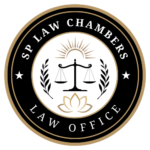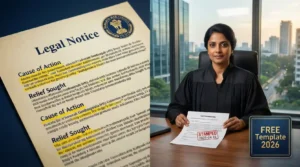Facing a cheque bounce notice or summons in Bengaluru? Our Section 138 team crafts fast, legally sound notice replies, builds robust defences, and represents you before Bengaluru Magistrate Courts and the City Civil Court. We prioritise early resolution through negotiation and mediation where appropriate and defend you vigorously when a trial is necessary.
- Speak with a lawyer now: Call +91 9916957929
- Prefer email/chat? Contact us for your first consultation free to assess your situation properly
- Seeking pre‑emptive protection before a dispute escalates? Visit SP Law Chambers
Why choose SP Law Chambers for cheque bounce defence in Bengaluru
- Bengaluru-first practice: We regularly appear before Bengaluru Magistrate Courts and the City Civil Court. Familiarity with local procedure, benches, and mediation pathways helps us move efficiently.
- Strategy before speed, but speed where it matters: Rapid notice replies (typically within 24–48 hours of onboarding) paired with a clear defence roadmap.
- Settlement if possible, trial if needed: We explore mediation and compounding where appropriate to avoid a criminal record and save time/cost, while preparing meticulously for trial when a negotiated outcome isn’t viable.
- E-filing and digital hygiene: We adopt e-filing and evidence management practices as permitted by court rules, keeping your case organised and visible.
Meet your lawyers in person or virtually, review our approach and representative matters, and read client feedback on our Google profile: Cheque Bounce Defence Lawyer in Bangalore
Who we help
- Accused/Drawer: Individuals and businesses who have received a legal notice or summons for alleged cheque dishonour. We respond promptly, examine defences, and represent you through mediation, trial, and appeals.
- Payee/Complainant: We also assist payees in drafting and issuing legal notices, filing the criminal complaint under Section 138, and pursuing compensation lawfully and efficiently. Learn more about our broader criminal law experience: criminal complaint
Our services for Section 138 NI Act matters
- Notice response and strategy (Accused): Drafting a well-reasoned reply within statutory timelines; assessing settlement options; preserving evidence to rebut presumptions under Sections 118 and 139.
- Case filing (Payee): Drafting legal notices, ensuring proper service, filing complaints under Section 138, and presenting evidence to demonstrate a legally enforceable debt/liability.
- Defence and trial work: Cross-examination, expert evidence (e.g., handwriting analysis for signature mismatch), applications, and case theory presentation.
- Mediation and compounding: Negotiation, instalment plans, and compounding applications under Section 147 of the NI Act where appropriate.
- Appeals and post-judgment: Advising on Sec 148 deposits at the appellate stage and strategy in Sessions Court/High Court.
- Advisory for directors/officers: Guidance on Section 141 vicarious liability for company-related cheques.
Section 138 NI Act explained: elements, timelines, and presumptions
Section 138 creates a criminal offence for dishonour of a cheque issued for discharge of a legally enforceable debt or liability. Key elements typically include:
- Cheque issuance: The cheque must be drawn by the accused on an account maintained by them.
- Legally enforceable debt/liability: The cheque was issued to satisfy a debt or liability recognised by law.
- Presentation and dishonour: The cheque is presented within its validity (usually three months from the date on the cheque unless otherwise notified) and returned unpaid for reasons such as insufficient funds, account closure, or signature mismatch, among others.
- Statutory notice: The payee must issue a written demand notice within 30 days of receiving the bank’s memo of dishonour.
- Non-payment within 15 days: If the drawer fails to make payment within 15 days of receipt of the notice, cause of action arises.
- Filing the complaint: The complaint is filed within the prescribed time after cause of action accrues, before the court having jurisdiction.
Presumptions and how they work
- Section 139 (read with Section 118(a)) creates a rebuttable presumption that the cheque was issued for the discharge of a debt or liability. Supreme Court jurisprudence (including Rangappa v. Sri Mohan and Hiten P. Dalal v. Bratindranath Banerjee) affirms that once execution is admitted or proved, the burden shifts to the accused to raise a probable defence on a preponderance of probabilities.
- Rebuttal may rely on cross-examination, documents, or circumstances that make the existence of the legally enforceable debt doubtful.
Jurisdiction and procedural notes
- Jurisdiction generally lies where the payee’s bank branch is located if the cheque is deposited for collection there, subject to the NI Act’s 2015 amendments (Section 142(2) and Explanations).
- Courts often encourage pre-trial mediation or compounding to reduce pendency. Participation is generally encouraged but settlement cannot be forced.
- Interim compensation under Section 143A and appellate deposit under Section 148 can apply in appropriate cases, subject to judicial discretion.
What to do if you receive a cheque bounce notice in Bangalore
Time is critical. Use this checklist within 48 hours of receiving the notice:
Preserve documents
- The notice (envelope, email headers if sent electronically)
- Cheque copy and bank return memo
- Any agreements, invoices, chats/emails related to the transaction
- Bank statements around the cheque date
Consult a Section 138 lawyer promptly
- A legally sound reply within 15 days can influence the case trajectory. Speak to our Section 138 advocates in Bangalore at +91 9916957929
Assess your position
- Can you pay or amicably resolve? Consider a settlement proposal, possibly through mediation.
- If you dispute the debt or cheque issuance, prepare evidence (communications, ledger entries, forensic opinions, etc.).
Send a reasoned reply
- If you contest liability, your reply may highlight issues such as absence of enforceable debt, misuse of a security cheque, signature discrepancy, or procedural defects.
- Ensure dispatch via a trackable method consistent with the mode indicated in the notice (registered post/speed post/email where acknowledged) and keep proof.
Prepare for next steps
- If payment is not made within the statutory period and the complainant files a case, be ready for summons. We handle anticipatory strategies and bail applications where necessary; timelines vary by court and facts.
Common defences we use in Section 138 cases
Defence strategy is fact-specific. Common themes include:
No legally enforceable debt or liability
- The cheque may have been issued as security without an immediately enforceable obligation. Supreme Court has clarified in various cases (including Bir Singh v. Mukesh Kumar and others) that even a blank or security cheque can attract Section 138 depending on facts; we examine the transaction trail carefully to demonstrate lack of enforceability when appropriate.
- Time-barred debt: Cheques issued solely for a time-barred debt can be contested since the underlying debt may not be legally enforceable.
Signature mismatch and handwriting issues
-
- Obtain the bank’s specimen signature records and engage a handwriting expert if needed.
- Demonstrate absence of fraudulent intent; show consistent historical signatures and communication to rebut presumption.
Consideration disputes and ledger contradictions
- Present accounting records, emails, and messages to show incorrect amounts, settlements, or absence of consideration.
Material alterations or technical defects
- Overwriting, mismatched amounts in words and figures, stale cheques, or missing essential details may undermine the complainant’s case if not cured.
Notice defects and service issues
- Incorrect addresses, lack of proper service, and statutory timeline lapses can be fatal to the complaint. Courts examine whether reasonable steps for service were taken and whether the drawer had actual knowledge.
Jurisdictional or procedural lapses
- Where and how the complaint was filed matters. Post-2015 rules determine proper jurisdiction. We examine filing compliance, limitation, and the applicability of summary trial.
Payment within the statutory window
- If the drawer pays within 15 days of receipt of notice, the offence is typically not made out.
For payees: Filing a criminal complaint and pursuing recovery
If you are the payee/complainant, your success often hinges on getting the basics right:
Draft a precise notice
- Identify the cheque, amount, date, bank, and grounds of dishonour. Demand payment within 15 days.
- Dispatch within 30 days of receiving the bank memo, preserving proof of sending and delivery.
Choose proper jurisdiction
- File where the law deems appropriate—typically where your bank branch is located if deposited for collection, per amended Section 142(2). We determine this during intake.
Prepare evidence
- Original cheque and return memo
- Proof of legally enforceable debt (agreement, invoice, ledger)
- Copy of legal notice and proof of service
- Witnesses who can corroborate the transaction
Consider interim compensation and compounding
- Courts may award interim compensation up to a statutory percentage at the trial stage (Sec 143A), in appropriate circumstances.
- Compounding under Section 147 is possible at any stage with court permission. This can save time and cost.
Civil recovery in parallel
- A civil suit for recovery may also be considered alongside the criminal process if the facts warrant it. We advise on scope, timelines, and cost-benefit.
Mediation, compounding, and settlements
Mediation pathways
- Many Bengaluru courts encourage pre-trial mediation for Section 138. It’s voluntary in outcome but valuable for quick resolution.
- Outcomes typically include lump-sum settlement or instalment plans with clear default terms.
Compounding benefits
- Compounding ends the criminal case upon agreed terms and court approval. Earlier compounding may reduce costs and time for both sides.
Practical approach
- We prepare a “settlement-ready” file: income evidence, proposed instalment schedule, security options (post-dated cheques, bank guarantee), and realistic timelines. This increases the chances of a fair, enforceable settlement.
Bail and summons in cheque bounce cases
Nature of proceedings
- Section 138 cases are generally summons cases. If summons are not complied with, courts may issue bailable warrants and, in some instances, non-bailable warrants.
Bail
- Where appropriate, we move swiftly for anticipatory or regular bail. While timelines depend on the court calendar and case facts, early action typically leads to faster relief.
Compliance and cooperation
- Attend hearings or seek exemptions through counsel when permitted. Non-compliance risks adverse orders.
Case timelines in Bengaluru courts
Timelines vary based on court workload, complexity, and party cooperation.
- Notice reply: 15 days from service of demand notice.
- Filing of complaint: Typically within the statutory limitation after cause of action accrues.
- Resolution:
- Settled cases through mediation/compounding: Often resolved faster, sometimes within a few months depending on cooperation and court schedules.
- Contested trials: Can take longer due to evidence, expert reports, and cross-examination phases.
Fees and billing transparency
We price based on complexity, stage, and scope. Typical ranges:
- Consultation and notice response strategy: ₹2,000–₹5,000
- Full defence or full filing and prosecution (single-accused/single-complainant matters): ₹25,000–₹1,00,000+
Factors influencing fees: corporate involvement, number of witnesses, expert evidence (handwriting), parallel civil suit, and appeal stages.
Discuss a tailored quote during your first consultation free to assess your situation properly
Documents checklist
Accused/Drawer (Defence)
- Copy of legal notice received and envelope/email headers
- Cheque copy, bank return memo
- Bank statements (around cheque date)
- Specimen signature records (if available)
- Communications with the payee (emails, messages, letters)
- Agreements/invoices/ledger entries relevant to the transaction
- Any proof of payment/part-payments or settlement attempts
- FIR/complaint details if cheque was lost/stolen and misused
Payee/Complainant (Filing)
- Original cheque and return memo
- Proof of legally enforceable debt (agreement, invoice, delivery notes, ledger)
- Draft of legal notice and proof of dispatch/delivery
- Identity/address proof and banking details
- Witness information (if any)
- Board resolution/authorisation (for companies)
Service areas across Bengaluru
We serve clients across Bengaluru (Bangalore), including:
- Central: MG Road, Richmond Town, Vasanth Nagar
- East: Indiranagar, Whitefield, Marathahalli, KR Puram
- South: Jayanagar, JP Nagar, BTM Layout, Banashankari
- North: Hebbal, Yelahanka, RT Nagar
- West: Rajajinagar, Vijayanagar, Malleshwaram
In-person and virtual consultations available city-wide.
FAQs: Cheque Bounce (Section 138) in Bangalore
Q1) Is jail inevitable in a cheque bounce case?
No. Many matters resolve through settlement or compounding. Even in contested cases, courts consider facts, defences, and mitigating circumstances. We focus on early resolution where appropriate and a strong defence where trial proceeds.
Q2) What if the cheque was a security cheque?
A security cheque can still attract Section 138 depending on the facts. Courts look at whether there was a legally enforceable liability on the date of presentation. We analyse the transaction to determine the best defence or strategy.
Q3) How long do I have to reply to a cheque bounce notice?
The drawer has 15 days from receipt of the demand notice to make payment. A timely, well-drafted reply can protect your rights and set up defences.
Q4) Can I challenge the complaint if the notice wasn’t served correctly?
Service and statutory timelines matter. If service is defective or timelines were not followed, that may be a defence. Courts also consider whether the drawer had actual knowledge of the notice.
Q5) Are company directors automatically liable?
Liability of directors/officers under Section 141 depends on whether they were in charge of and responsible for the conduct of business at the relevant time. Signature is not the sole test. We assess roles, board authorisations, and evidence.
Q6) Can I recover money through the criminal case alone?
Criminal proceedings seek to deter dishonour and may result in fine/compensation orders. In appropriate cases, a parallel civil suit for recovery can be pursued for comprehensive relief.
Q7) What happens if I pay within 15 days of receiving the notice?
If the drawer pays within the statutory 15 days of receipt of notice, the offence is typically not made out. Keep documentary proof of payment and inform the payee.
Q8) Do Bengaluru courts require mediation?
Courts frequently encourage or refer Section 138 cases to pre-trial mediation to explore settlement. Participation is generally expected in good faith, but settlement is voluntary.
About SP Law Chambers
SP Law Chambers is a Bengaluru-based practice handling cheque dishonour (Section 138) matters across Magistrate Courts and the City Civil Court. Our approach blends:
- Practical negotiation and mediation skills to attempt time- and cost-efficient resolutions
- Rigorous procedural and evidentiary defence at trial where appropriate
- Transparent communication and timelines
You can also explore our broader criminal law capabilities here: NI Act Lawyers in Bangalore
Contact and next steps
- Talk to a lawyer: +91 9916957929
- Book your first consultation free to assess your situation properly
- If you’re seeking pre‑emptive protection or want to understand your options before a dispute escalates, visit SP Law Chambers
- See our location, posts, and reviews: Cheque Bounce Defence Lawyer in Bangalore
Professional disclaimer
- Laws, rules, and court practices evolve. This page provides general information and is not legal advice. Outcomes depend on specific facts and applicable law. Please consult a lawyer for advice on your situation.

Advocate Geethanjali Setty is the driving force behind SP LAW CHAMBERS. With over 14 years of hands-on legal experience, she is known for her ethical, result-oriented approach. Geethanjali is registered with the Bar Council of Karnataka and has built a reputable practice offering comprehensive legal consultancy and advisory services. She and her team of six dedicated advocates handle a wide range of legal matters with integrity and efficiency.
At SP LAW CHAMBERS, clients receive not just legal expertise, but also a commitment to clear, client-focused guidance. Geethanjali’s focus on client satisfaction and her proven track record make her a trusted name in the Bangalore legal community.




